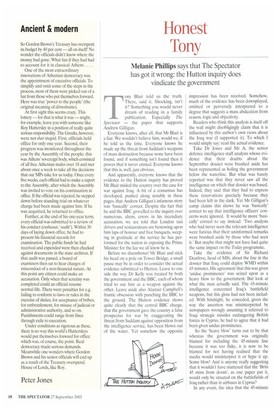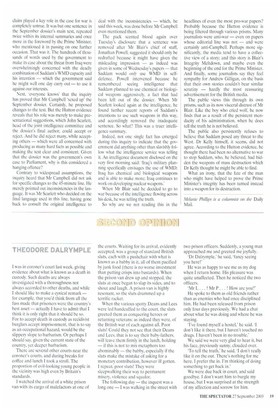Honest Tony
Melanie Phillips says that The Spectator has got it wrong: the Hutton inquiry does vindicate the government
Tony Blair told us the truth. There, said it. Shocking, isn't it? Something you would never dream of reading in a family publication. Especially The Spectator — the paper that supports Andrew Gilligan.
Everyone knows, after all, that Mr Blair is a liar. We wouldn't believe him, would we, if he told us the time. Everyone knows he made up the threat from Saddam's weapons of mass destruction because none have been found, and if something isn't found then it proves that it never existed. Everyone knows that this is, well, just obvious.
And apparently, everyone knows that the evidence to the Hutton inquiry has proved Mr Blair misled the country over the case for war against Iraq. A bit of a consensus has developed, pushed along notably in these pages, that Andrew Gilligan's infamous story was 'basically' correct. Despite the fact that he and the BBC grovelled to the inquiry over numerous, ahem, errors in his incendiary accusation, we are told that London taxi drivers and restaurateurs are bestowing upon him laps of honour and free banquets, weeping in gratitude at the service he has performed for the nation in exposing the Prime Minister for the liar we all know he is.
Before we disembowel Mr Blair and stick his head on a pole on Tower Bridge, a small pause may be in order to consider the actual evidence submitted to Hutton. Leave to one side the way Dr Kelly was treated by both the government and the BBC, each of whom tried to use him as a weapon against the other. Leave aside also Alastair Campbell's frantic obsession with punching the BBC to the ground. The Hutton evidence shows quite clearly that the central BBC charge, that the government gave the country a false prospectus for war by exaggerating the threat from Saddam against opposition from the intelligence service, has been blown out of the water. Yet somehow the opposite impression has been received. Somehow, much of the evidence has been downplayed, omitted or perversely interpreted to a degree that suggests a mass abdication from reason, logic and objectivity.
Readers who think this analysis is itself off the wall might disobligingly claim that it is influenced by this author's own views about the Iraq war (I supported it). To which I would simply say: read the actual evidence.
Take Dr Jones and Mr A, the senior defence intelligence staff analysts whose evidence that their doubts about the September dossier were brushed aside has been represented as holing the government below the waterline. But what was barely reported was that they never saw all the intelligence on which that dossier was based. Indeed, they said that they had to express these reservations precisely because they had been left in the dark. Yet Mr Gilligan's camp claims this shows he was 'basically' correct to say that intelligence officers' concerns were ignored. It would be more 'basically' correct to say instead: 'Two analysts who had never seen the relevant intelligence were furious that their uninformed remarks were brushed aside by those who had seen it.' But maybe that might not have had quite the same impact on the Today programme.
Take the evidence of Sir Richard Dearlove, head of MI6, about the line in the dossier that Iraq could deploy WMD within 45 minutes. His agreement that this was given 'undue prominence' was seized upon as a heavy blow to the government. But look at what the man actually said. The 45-minute intelligence concerned Iraq's battlefield weapons, but this gloss had not been included. With hindsight, he conceded, given the way the assertion was misinterpreted by newspapers wrongly assuming it referred to Iraqi strategic missiles endangering British forces in Cyprus, he had to agree that it had been given undue prominence.
So the 'heavy blow' turns out to be that whereas the government was originally blamed for including the 45-minute line because it was too flaky, it is now to be blamed for not having realised that the media would misinterpret it or hype it up. Some blow! And is anyone really suggesting that it wouldn't have mattered that the 'Brits 45 mins from doom', as one paper put it, would only be situated on the battlefields of Iraq rather than in airbases in Cyprus?
In any event, the idea that the 45-minute claim played a key role in the case for war is completely untrue. It was but one sentence in the September dossier's main text, repeated twice within its internal summaries and once more in the foreword by the Prime Minister, who mentioned it in passing on one further occasion. That was it. The hundreds of thousands of words used by the government to make its case about the threat from Iraq were overwhelmingly concerned with the deadly combination of Saddam's WMD capacity and his intention — which the government said he might well one day carry out — to use it against our interests.
Next, 'everyone knows' that the inquiry has proved that Mr Campbell 'sexed up' the September dossier. Certainly, he proposed changes to the text. But the Hutton evidence reveals that his role was merely to make presentational suggestions, which John Scarlett, head of the joint intelligence committee and the dossier's final author, could accept or reject. And he did reject many, while accepting others — which were all concerned with producing as many hard facts as possible and making the text clear and consistent. Given that the dossier was the government's own case to Parliament, why is this considered a hanging offence?
Contrary to widespread assumptions, the inquiry heard that Mr Campbell did not ask for specific changes to the 45-minute line. He merely pointed out inconsistencies in the language. It was Mr Scarlett who decided on the final language used in this line, having gone back to consult the original intelligence to deal with the inconsistencies — which, he said this week, was done before Mr Campbell even mentioned them.
The pack scented blood again over Tuesday's disclosure that a sentence was removed after Mr Blair's chief of staff, Jonathan Powell, suggested it should only be redrafted because it might have given the misleading impression — as indeed was given in some of Wednesday's papers — that Saddam would only use WMD in selfdefence. Powell intervened because he remembered seeing intelligence that Saddam planned to use chemical or biological weapons aggressively, a fact that had been left out of the dossier. When Mr Scarlett looked again at the intelligence, he found further recent reports of Saddam's intentions to use such weapons in this way, and accordingly removed the inadequate sentence. So what? This was a truer intelligence summary.
Indeed, not one single fact has emerged during this inquiry to indicate that the government did anything other than slavishly follow what the intelligence service was telling it. An intelligence document disclosed on the very first morning said: 'Iraq's military planning specifically envisages the use of WMD; Iraq has chemical and biological weapons and is able to make more; Iraq continues to work on developing nuclear weapons.'
When Mr Blair said he decided to go to war because of the intelligence flowing across his desk, he was telling the truth.
So why are we not reading this in the headlines of even the most pro-war papers? Probably because the Hutton evidence is being filtered through various prisms. Many journalists were anti-war — even on papers whose editorial line was not — and were certainly anti-Campbell. Perhaps more significantly, the media tend to have a collective view of a story; and this story is Blair's Integrity Meltdown, and maybe even the beginning of the end for the Prime Minister. And finally, some journalists say they feel sympathy for Andrew Gilligan, on the basis that their own stories couldn't bear similar scrutiny — hardly the most reassuring advertisement for the British media.
The public views this through its own prisms, such as its now visceral distrust of Mr Blair. Like the boy who cried wolf, he now finds that as a result of the persistent mendacity of his administration, when he does tell the truth he is not believed.
The public also persistently refuses to believe that Saddam posed any threat to the West. Dr Kelly himself, it seems, did not agree. According to the Hutton evidence, he thought there had been no alternative to war to stop Saddam, who, he believed, had hidden the weapons of mass destruction which Dr Kelly thought he might be able to find.
What an irony, that the fate of the man who might have helped to prove the Prime Minister's integrity has been turned instead into a weapon for its destruction.
Melanie Phillips is a columnist on the Daily MaiL



























































































 Previous page
Previous page